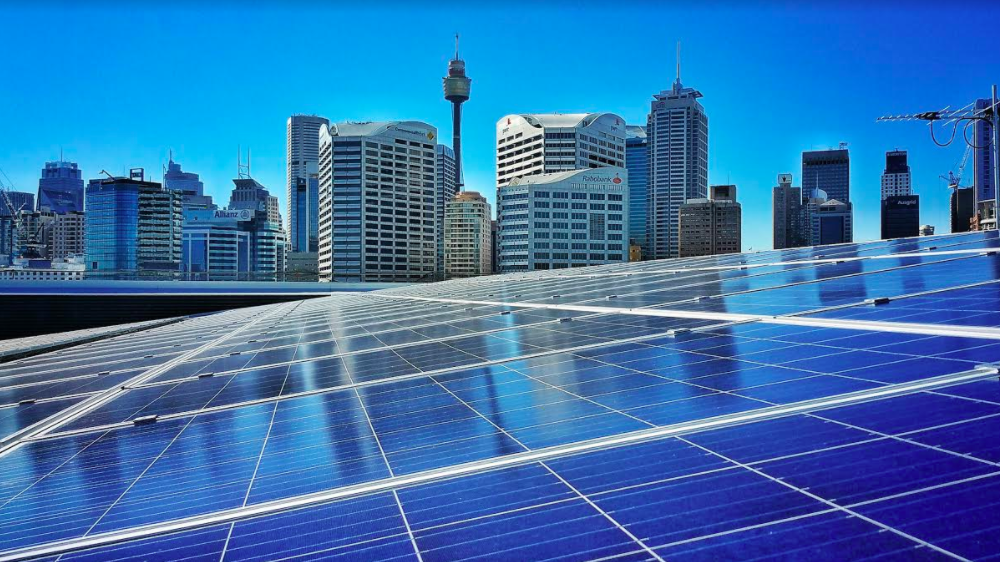Australian Renewable Energy Fund Solar Bay has committed $350 million to a solar buyback initiative, which would alleviate stress on Australian businesses.
Solar Bay is beginning the runout of its $350 million war-chest by purchasing the rights to the famous solar array atop the Sydney International Convention Centre.
Basically, over the next three years, Solar Bay intends to deploy its funds to solar projects in the commercial and industrial sectors throughout Australia and the Asia Pacific. By purchasing existing solar system assets, Solar Pay proposes to enter into long term off-take agreements (PPA’s) to sell back energy at discounted rates to the original vendor of the solar assets.
The 500 kW system at the Convention Centre was previously owned by Sydney Renewable Power Company Limited (SRPCL), and was one of the first community-funded solar energy projects in the country.
PPA’s are an increasingly popular method of funding and utilising on-site solar energy. Indeed, SRPCL was one of the pioneers of the market when it entered into a PPA in 2013 with Darling Harbour Live Partnership, the operator of the Sydney International Convention Centre property, on behalf of the NSW Government.
“We started SRPCL because at the time we were frustrated at the lack of support and action for renewable energy development,” said Andy Cavanagh from SRPCL. “Volunteers created this project and we are proud of what we have achieved.”
Solar Bay, backed by a consortium of family offices, was established in 2016 but only recently acquired its $350 million mandate. “Family Office impact investment capital is a source of our competitive advantage,” said Solar Bay Investment Director Andrew Archibald, “we are able to offer attractive purchase prices to vendors on their systems, whilst providing long term energy costs below market prices to a range of businesses including ASX listed companies.”
Solar Bay says on-site solar generation systems are becoming increasingly popular for PPA’s in preference to the utility-scale projects PPA’s usually cater for. The most obvious reason is the connection and regulatory issues associated with utility-scale projects. Grid congestion and transmission issues are damming up the renewable energy pipeline.
Solar Bay’s investment plan is part of a wider trend towards the smaller-scale. In February, analysis from the Clean Energy Council (CEC) found that new investment on large-scale renewable projects had collapsed by more than 50% following the federal policy vacuum beginning this year and the continuance of under-investment into network capacity.
Nevertheless, as we are seeing predominantly in South Australia , there is a strong surge toward small-scale utility solar (around the 5 MW mark) as a new niche, and on-site solar is a growing niche on its own.
In addition to the investment trend toward the smaller-scale already in play, the macroeconomic situation brought about by Covid-19 quarantine regulations has meant that many impacted businesses are desperate to replenish their cash flows. “Solar Bay is looking to purchase existing solar systems from large businesses,” said James Doyle, another Investment Director at Solar Bay, “potentially freeing up material amounts of capital, thereby allowing these companies to avoid dilutionary capital raises.”
“Moreover,” continued Doyle, “the PPA will provide businesses with long term price certainty at rates that are often up to 20-40% below their current cost of power from the grid.”
Solar Bay believes almost a third of its investment mandate will be deployed over the next six months.
This content is protected by copyright and may not be reused. If you want to cooperate with us and would like to reuse some of our content, please contact: editors@pv-magazine.com.









By submitting this form you agree to pv magazine using your data for the purposes of publishing your comment.
Your personal data will only be disclosed or otherwise transmitted to third parties for the purposes of spam filtering or if this is necessary for technical maintenance of the website. Any other transfer to third parties will not take place unless this is justified on the basis of applicable data protection regulations or if pv magazine is legally obliged to do so.
You may revoke this consent at any time with effect for the future, in which case your personal data will be deleted immediately. Otherwise, your data will be deleted if pv magazine has processed your request or the purpose of data storage is fulfilled.
Further information on data privacy can be found in our Data Protection Policy.